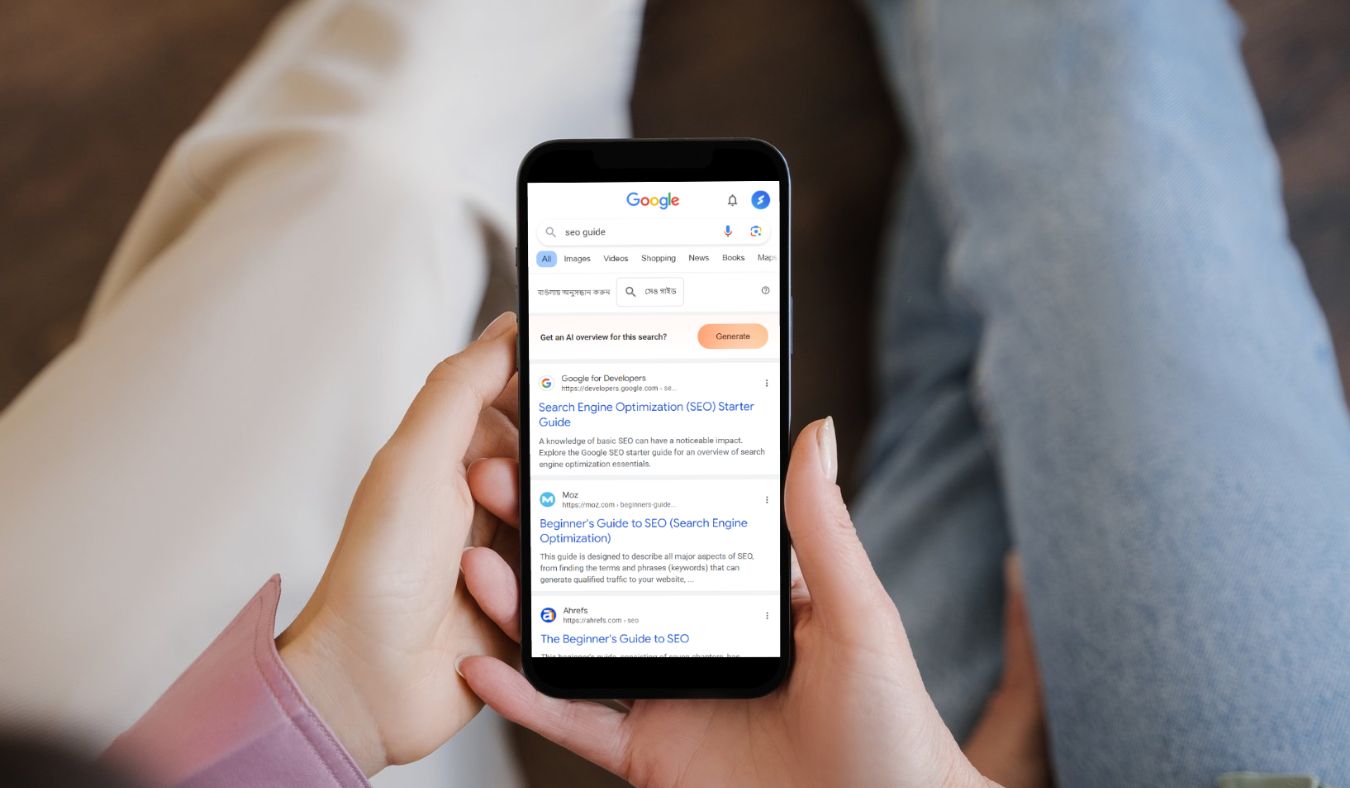Let’s face it: when you’re launching a startup, your marketing budget probably competes with your lunch budget for the title of “most depressing.” But here’s the good news: SEO (Search Engine Optimization) is the secret weapon to getting your business in front of the right people online, even if you don’t have a ton of cash to throw around. Think of it like this: SEO helps you build visibility on Google and other search engines organically, so your ideal customers can find you when they’re searching for the solutions you provide.
SEO’s Role in Digital Marketing : SEO isn’t a magic bullet, but it’s a foundational piece of a well-rounded digital marketing strategy. Here’s how it plays with the other important pieces:
- Content Marketing: The awesome blog posts, videos, or guides you create? SEO helps ensure the RIGHT people actually see them.
- Social Media: While social signals don’t necessarily boost your rankings directly, those shares can get your content more visibility, which can lead to organic links and a boost in traffic… all of which eventually pleases the Google gods.
- Paid Ads: SEO is the long game, while paid ads (like Google PPC) can get you fast visibility. Ideally, the two work in tandem.
This Guide is For You If…
- You’re a Founder on a Mission: You wear a million hats, and “SEO Expert” probably isn’t one of them yet, but you’re ready to learn the basics.
- Your Budget is Humble: No shame in the bootstrapping game! This guide focuses on tactics you can do yourself or outsource minimally if needed.
- You’re in It for the Long Haul: SEO is NOT about getting rich quick. But if you’re committed to doing the work, this guide will help you see results over time.
Ready to dive into the world of SEO? Let’s get started!
1. Understanding SEO Basics
a) What is SEO?
Think of SEO (Search Engine Optimization) as a way of speaking the same language as search engines like Google. Its goal is to make your website so clear and relevant in answering your target audience’s search queries that Google is happy to show it high up in the search results. After all, Google wants to give its users the best experience possible!
b) The Power of Search Visibility
Let’s use an example to make this real:
- Problem: Imagine you’re a startup selling sustainable backpacks made from recycled materials.
- Customer Search: Someone types into Google “best eco-friendly backpacks for college.”
- Good SEO: Your website appears on the first page of results because you’ve optimized your pages with related words (and provided helpful content that truly answers that question).
- The Win: That searcher clicks on your website, learns about your awesome backpacks, and maybe becomes a paying customer.
This is what we mean by “free, targeted traffic.” Instead of paying for ads, people are finding you organically because you showed up when they were already actively looking for a solution you provide.
2. Keyword Research: Your SEO Foundation
a) Why Keywords Matter (And Why It’s NOT Just About Stuffing)
Back in the ‘wild west’ days of the internet, you could kinda trick Google by cramming a bunch of random keywords onto your page, whether they made sense or not. Thankfully, those days are gone! Here’s why keywords still matter, but with a much more sophisticated approach:
- Search Engines are Smart: Google’s primary goal is to understand what the searcher actually wants (this is called search intent). Your keywords need to align with that.
- Example: “Vegan recipes” is too broad. “Easy weeknight vegan dinner recipes” is far more specific to someone’s intent when they search.
- Think Like Your Customer: What problems are they trying to solve? What exact phrases would they use to find an answer?
b) Tools to the Rescue
Let’s not make this harder than it needs to be, especially for startups! Here’s a mix of tools to uncover the keywords that can give you the best chance of ranking well:
Freebies
- Google Trends: See how popular search terms are over time. Great for spotting seasonal trends related to your niche.
- Answer the Public: Tells you what questions people are asking around a topic. Turns those into potential long-tail keywords.
- Your Search Bar: Start typing in a basic keyword, see what autocomplete suggests. This gives a glimpse into related searches people do.
Paid (But Often Have Free Trials)
- Ahrefs, SEMrush, etc.: These are powerful, but can be overwhelming for beginners. If you try them, focus on features that find long-tail, lower competition terms.
c) Audience First: Keywords Aligned with Your Ideal Customer
Always choose keywords that reflect how your ideal customers are searching for solutions to their problems. Here’s how to ensure you’re on the right track:
- Get Inside Their Heads: Who are you serving? What are their biggest pain points? What keeps them awake at night? Turn those into natural phrases.
- Avoid Jargon: Don’t use overly technical terms your audience wouldn’t. Match the way they speak.
- Location Matters: If you’re a local business, include city/region in your keywords (ex: “Denver hair salon”)
3. Mastering On-Page SEO
The good news: some of the most powerful SEO tactics are completely within your control, even if you’ve never touched a line of code in your life. Let’s focus on the low-hanging fruit that can make a big difference.
a) The Essentials
- Title Tags: This is the clickable headline people see in search results. Make it clear what your page is about AND enticing to get that click. (Tools like Yoast SEO for WordPress can help format this easily.)
- Meta Description: The short blurb below your title in search results. Think of it like ad copy to convince someone your page is THE answer they’re looking for. Include your target keyword naturally here too.
- Header Structure: Use H1, H2, H3 tags like an outline. Your most important keyword phrase should be in your H1 (usually your page title).
- Image Optimization: Name image files descriptively (instead of “IMG1234.jpg” use “sustainable-laptop-backpack.jpg”). And always add Alt-Text, which is a text description for visually impaired users and helps search engines understand your image.
- Internal Linking: Link to other relevant pages within your own website. This helps users navigate and signals to Google which of your content is most important.
b) Content is King, But SEO is Queen
We could make your website technically perfect for search engines, but if the content itself is boring, unhelpful, or thin… no one will stick around long enough for your SEO efforts to work their magic. Here’s the key:
- Solve a Problem: What are your ideal customers struggling with? Create content that offers solutions.
- Keywords Used Naturally: Weave your target keywords into your content in a way that feels organic, not forced.
- Be the Expert: Provide unique insights and value, making yourself the go-to authority in your niche.
Important Note: On-page SEO is something you should revisit regularly as you add new content and blog posts to your site!
4. Off-Page SEO for Startups
Think of off-page SEO as your website’s popularity contest with Google. While you have direct control over on-page factors, off-page is all about signals from around the web that vouch for the trustworthiness and relevance of your site.
a) Backlinks: Search Engine Gold
- The Basic Idea: When another reputable website links to yours, it’s like a vote of confidence in the eyes of search engines.
- Authority Boost: Backlinks from high-quality sites in your niche are SEO gold dust. They help improve your own website’s authority.
- Quality over Quantity: A few backlinks from relevant, respected sites are worth FAR more than hundreds of spammy links from irrelevant places.
b) Ethical Tactics Only
The world of link building can be shady, but startups need to be extra careful to protect their reputation. Focus on these white-hat strategies:
- Guest Posting: Offer to write high-value articles for blogs in your industry in exchange for a link back to your site.
- Resource Creation: Create in-depth guides, infographics, or tools so useful that other websites naturally want to link to them.
- Niche Partnerships: Can you collaborate with complementary (but non-competing) businesses in your space to cross-promote and potentially link to each other?
- Broken Link Building: Find broken links on relevant sites and reach out to suggest replacing them with a link to your own working resource.
c) Social’s Supporting Role
While likes and shares won’t magically boost your rankings, social media plays a vital indirect role in off-page SEO.
- Content Amplification: The more your content is seen, the greater the chance people will link to it organically if they found it valuable.
- Influencers/Brand Mentions: Engaging with the right people in your niche can sometimes lead to them sharing your stuff, earning you potential backlinks.
- Build Relationships: Social is for networking, which can open doors to guest posting and other off-page opportunities.
Important Note: Backlink building takes time and consistent effort. For startups, a slow and steady approach focused on acquiring a few high-quality links each month is the way to go.
5. Technical SEO Made Simple
Don’t worry, we’re not going to get into complex code here! Startups can make a big difference to their SEO with a few basic technical elements. Remember, Google cares about providing a good user experience, and these factors directly impact that.
a) The Low-Hanging Fruit
- Site Speed: Slow-loading pages frustrate visitors and search engines. Tools like Google PageSpeed Insights give you a score and actionable tips for improvement.
- Mobile-Friendliness: More people browse on phones than desktops. Google’s Mobile-Friendly Test tells you if your site is up to par.
- SSL (The Little Padlock): This signals your site is secure (https://). Most hosting providers offer this for free. It’s a small but important trust signal.
b) Structured Data Demystified
Structured data is a way to ‘mark up’ your website’s content (recipes, events, product reviews, etc.) in a language search engines easily understand. This can result in fancy things like recipe ratings appearing right in your Google search results. Here’s how to make it simple:
- Understanding Schema: The most common vocabulary for structured data is called Schema.org.
- WordPress to the Rescue: Plugins like Schema Pro or RankMath can add the right markup without you ever needing to touch code.
- Start with ONE Content Type: Do you have a lot of blog posts? Recipes? Choose one and focus on adding structured data to those pages first
6. Local SEO: Get on the Map
If your startup has a physical storefront, caters to a specific city/region, or offers services where you travel to clients, local SEO is essential for getting found by the right people nearby.
a) Who This Matters For
- Brick & Mortars: Restaurants, shops, salons, repair services… anyone who relies on foot traffic.
- Service-Area Businesses: Contractors, plumbers, even dog walking companies that serve certain neighborhoods.
- Local Thought Leaders: If you build your reputation as the go-to expert in your city, it boosts your online visibility too.
b) Google My Business is Key
Your Google My Business (GMB) profile is often the first thing people see when searching locally. Make sure yours is:
- Claimed and Verified: Take ownership of your listing!
- Complete: Accurate hours, address, photos, service descriptions, etc.
- Review Management: Encourage happy customers to leave reviews and respond to both positive AND negative ones.
c) Location-Specific Content
Blogging about local events, creating a resource guide for your city, or partnering with other local businesses strengthens your association with the area in Google’s eyes. Examples:
- A Denver-based web designer: A blog post titled “The Best Coworking Spaces in Denver for Startups”
- A sustainable clothing boutique: A “Gift Guide for the Holidays Featuring Local Colorado Makers”
- A home cleaning service: Optimized neighborhood-specific service pages on their website.
Additional Tips
- Local Citations: Getting your business listed in online directories (think Yelp, but also niche ones for your industry) builds signals.
- Consistency Matters: Make sure your business name, address, and phone number (NAP) are identical across your website, social media, etc.
7. Tracking Your SEO Success
SEO is an investment, so it’s important to know if it’s paying off. But with all the data out there, it can be overwhelming! Let’s simplify it, especially for early-stage startups.
a) Metrics that Matter for Startups
- Organic Traffic Growth: Are more people finding your website through search engines over time? (Google Analytics is your friend here).
- Keyword Rankings: Track how you rank for your target keywords. Small improvements compound into significant gains!
- Leads/Conversions from Search: The ultimate goal – are those SEO visitors taking actions that help your business? Setting up conversion tracking is key.
b) Google Analytics & Search Console: Your Power Duo
These are both free tools from Google that give you invaluable insights. Here’s the basic breakdown:
- Google Analytics: Understand visitor behavior on your site: pages visited, time spent, where traffic comes from (search, social, etc.), bounce rate… the works!
- Google Search Console: See which keywords you actually rank for, click-through rates from search results, technical errors Google sees… this helps refine your strategy.
c) Other Tools Worth Considering
As your startup grows, paid tools offer more advanced tracking. These are worth looking into later, but can be overwhelming early on:
- Ahrefs, SEMrush, etc.: Detailed keyword tracking, competitor analysis, backlink monitoring.
- Call Tracking Software: If phone calls are a major lead source, this lets you see which came from search traffic.
- CRM Integration: Tying SEO data into your customer relationship management system lets you track revenue generated directly from search.
Important Note: SEO is a marathon, not a sprint. Track your progress regularly (monthly is a good cadence at first) and look for overall trends, not freaking out over daily fluctuations.
Getting Started
SEO is not an overnight fix. It’s about building a strong foundation, steady progress, and being adaptable in an ever-changing landscape.
- The Long-Game Mentality: Big results in SEO take consistent effort over time. Focus on sustainable tactics, not trying to game the system with shortcuts.
- Celebrate Small Wins: Did you move up a few spots in rankings for an important keyword? Did your organic traffic see a month-over-month increase? Acknowledge those victories to stay motivated.
- Stay Curious, Keep Learning: Google updates its algorithms, new SEO tools emerge… being willing to evolve alongside the industry is key for long-term success.
- Choose One Task: Don’t try to do it all! Pick ONE thing from this guide – optimize your title tags, do some keyword research, fix your site speed… and take action on it this week.
Remember: Every step you take, even if it feels small, moves you closer towards greater online visibility for your startup. Your future customers are out there searching – let’s help them find you!
Need a Personalized Roadmap?
SEO can be complex, especially when you’re juggling a million other startup tasks. Let’s chat! We offer Free SEO Consultations to create a tailor-made SEO plan for your unique business needs.




